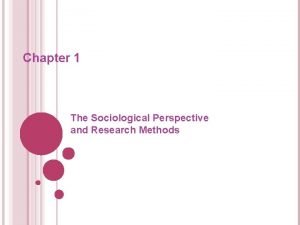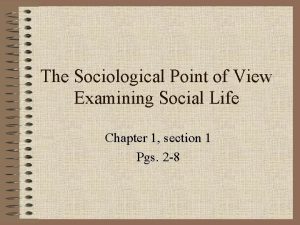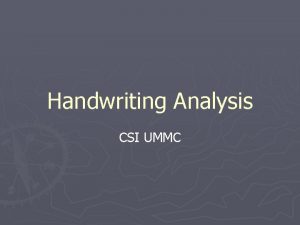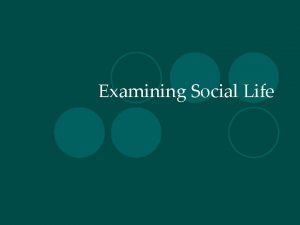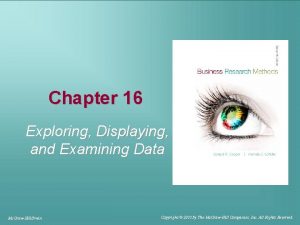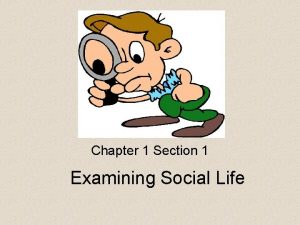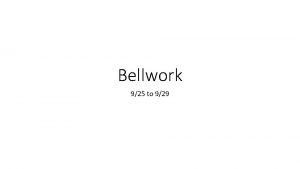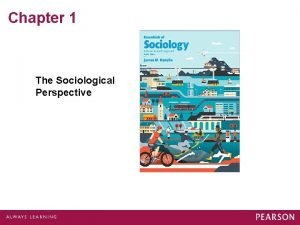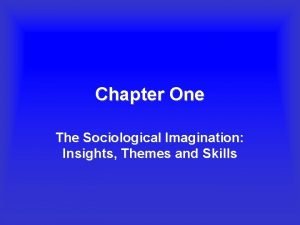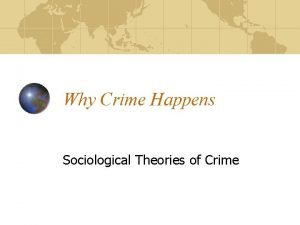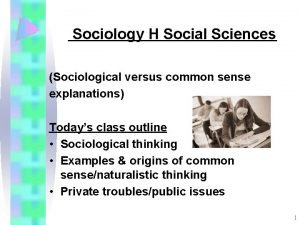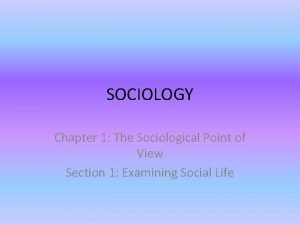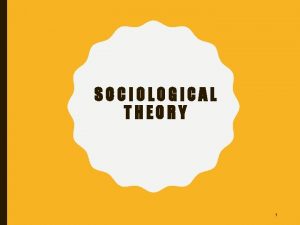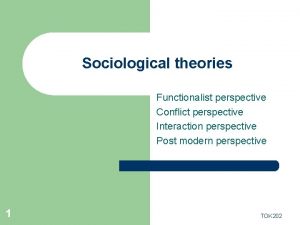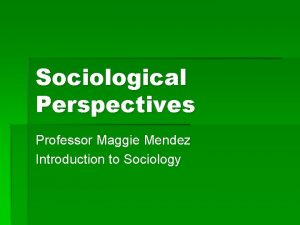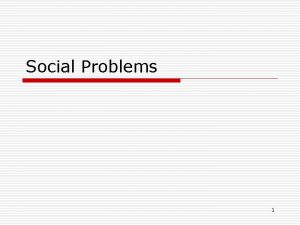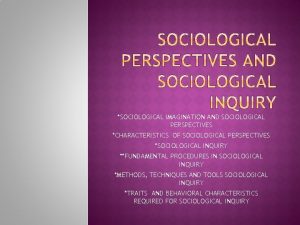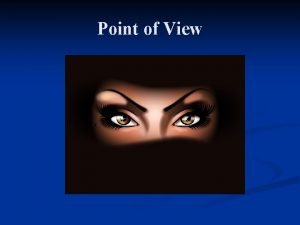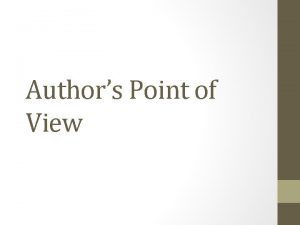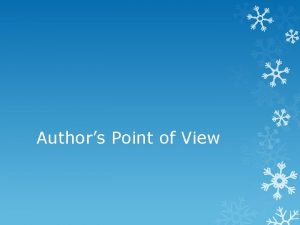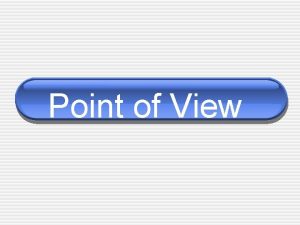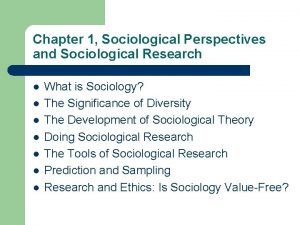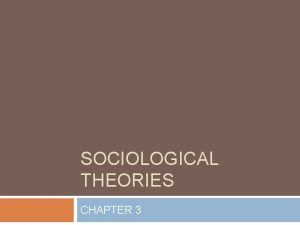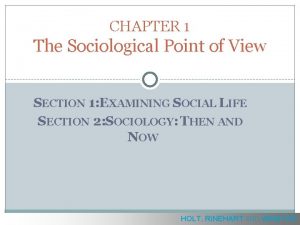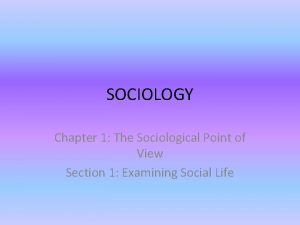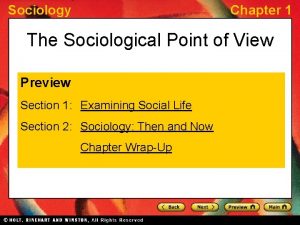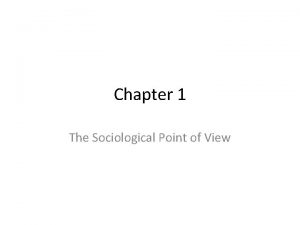THE SOCIOLOGICAL POINT OF VIEW Chapter 1 Examining




















- Slides: 20

THE SOCIOLOGICAL POINT OF VIEW Chapter 1

Examining Social Life Our daily lives shape our view of the world. The values, beliefs, lifestyles, and experiences of those around us, including historic events help mold our outlook on life. Not everyone views things in society the same, however, most of us in society share many of the same characteristics and ideas. ◦ Sociology is the social science that studies human society and social behavior ◦ Social Sciences are the disciplines that study human social behavior or institutions and functions of human society in a scientific manner ◦ Social Interaction – how people relate to one another and influence each other’s behavior ◦ Social phenomenon – observable facts or events that involve human society

Examining Social Life ◦ The sociological perspective involves looking at social life in a scientific systematic way rather than depending on common sense ◦ Things the sociological perspective allows us to see: ◦ that all people are social beings ◦ Your behavior is influenced by social factors ◦ You learned your behavior from others ◦ Many different perceptions of social reality

Examining Social Life ◦ The sociological perspective can also help you find balance between your personal desires and the demands of your social environment. ◦ For example: ◦ if you always do what you want, you will most likely conflict with people, but if you always do what other want, you will may not be happy The goal is to find the most acceptable points between these two behaviors

Examining Social Life ◦ The sociological imagination is the ability to see the connection between the larger world and your personal life. ◦ According to C. Wright Mills any good sociologist must have “the capacity to range from the most impersonal and remote topics to the most intimate features of the human self – and to be able to see the relations between the two”

Examining Social Life ◦ In addition to sociology, the social sciences include anthropology, psychology, economics, and political science ◦ Anthropology is the study of past and present cultures ◦ Most similar to sociology

Examining Social Life ◦ Psychology is the science that deals with the behavior and thinking of organisms ◦ It differs from sociology in that it studies the individual rather than groups of people ◦ However, social psychology studies how the social environment affects an individual’s behavior and personality

Examining Social Life ◦ Economics is the study of the choices people make in an effort to satisfy their needs and wants. ◦ They also examine the effects of government policies on economic growth and stability ◦ Political Science examines the organization and operation of governments ◦ History is the study of past events. ◦ Sociologists are very interested in the past. ◦ They use the past to explain current social behaviors and attitudes

Sociology: Then and Now ◦ The nature of social life and human interactions has been of interest to scholars throughout history. ◦ Several factors led to the development of sociology ◦ Rapid social and political changes in Europe ◦ The Industrial Revolution ◦ Urban growth ◦ Revolutions By the 1800’s scholars believed that the social world was based on a set of principles that could be studied using the scientific method

Sociology: Then and Now ◦ In the 1800’s sociology primarily took root in France, Germany, and England. ◦ These countries had been most affect by the Industrial Revolution ◦ Some of the most influential sociologists include: ◦ August Comte ◦ Herbert Spencer ◦ Karl Marx ◦ Emilie Durkheim ◦ Max Weber

Sociology: Then and Now ◦ Auguste Comte (1798 – 1857) ◦ Founder of sociology as a distinct subject ◦ From France ◦ Intrigued by the causes and consequences of the French Revolution ◦ Focused on social order and social change ◦ Social static – holds society together ◦ Social dynamics – the process of societal change ◦ Most of his theories of society have been refuted

Sociology: Then and Now ◦ Herbert Spencer (1820 – 1903) ◦ From England ◦ Strongly influenced by Charles Darwin ◦ He believed in social evolution ◦ Social Darwinism – survival of the fittest

Sociology: Then and Now ◦ Karl Marx (18181 – 1883) ◦ Prussian ◦ Influenced Communism ◦ Marx believed is influenced by how its economy is organized. Two social classes ◦ Bourgeoisie (capitalists) ◦ Proletariat (workers) ◦ The bourgeoisie own the means of production while the proletariat own nothing ◦ Marx believed class conflict would only end when the proletariat overthrow those in power. ◦ Then there would be a classless society (Think Communism)

Sociology: Then and Now ◦ Emile Durkheim (1858 – 1917) ◦ From France ◦ One of the first sociologists to systematically apply the methods of science to the study of society ◦ Like Comte, Durkheim was interested in problems of social order. ◦ Like Spencer, he saw society as a set of interdependent parts ◦ Durkheim look at functions or consequences that an element of society produces for the maintain of its social system ◦ He was also interested in the effect of religion in terms of maintaining social order ◦ He also studied suicide by examining the suicide rates in several European countries ◦ This was the first true sociological study

Sociology: Then and Now ◦ Max Weber (1864 – 1920) ◦ Prussian ◦ Unlike the other major sociologists, he was interested in separate groups within society rather than society as a whole ◦ He also believed in going beyond what can be observed and attempting to uncover feelings ◦ Verstehen – putting oneself in the place of others and tries to see the situation from their point of view ◦ Ideal type - description comprised of the essential characteristics of a feature of society ◦ School

Sociology: Then and Now Current perspectives ◦ A theory is an explanation of the relationships among particular phenomena ◦ Sociologists develop theories to guide their work ◦ Theoretical perspectives provide a foundation for their inquiries ◦ A theoretical perspective is also known as a school of thought ◦ There are three broad theoretical perspectives ◦ Functionalist ◦ Conflict ◦ interactionist

Sociology: Then and Now Functionalist Perspective ◦ Based on the ideas of Comte, Spencer, and Durkheim ◦ Views society as a set of interrelated parts that work together to produce a stable social system ◦ Topics of interest usually include things like family or education ◦ Dysfunctional – the negative consequence of an element ◦ Dysfunctional elements such as crime disrupt society rather than stabilize it ◦ Manifest function – the intended and recognized consequence of some element of society ◦ Function of a car is speedy transportation ◦ Latent function – the unintended and unrecognized consequence o an element of society ◦ Function of a car is to show social status (Benz vs Ford)

Sociology: Then and Now Conflict Perspective ◦ Focuses on the forces of society that promote competition and change ◦ Conflict theorists don’t limit their attention to acts of violent crimes ◦ They are also interested in non-violent competition between various groups ◦ Men vs women ◦ People of different ages ◦ People of different racial/national backgrounds ◦ They look at relationships between different groups ◦ Decision making in families ◦ Relationships among racial groups ◦ Dispute between workers and employers

Sociology: Then and Now ◦ According to conflict theorists, competition over scares resources is the basis of social conflict ◦ Resources like wealth and power are limited in supply and people must compete for them ◦ Once a particular group gains control of a society’s resources, they tend to establish rules and procedures to protect their interests at the expense of other groups. ◦ This leads to social conflict ◦ Social conflict leads to change

Sociology: Then and Now Interactionist Perspective ◦ Focuses on how individuals interact with one another in a society ◦ Unlike functionalist and conflict theories, which focus on society in general or groups within society ◦ Looks at how individuals respond in everyday situations ◦ Symbol – anything that represents something else ◦ In order for something to be a symbol members of society must agree on the meanign that is attached to it ◦ Bald Eagle = America ◦ Symbolic interaction focuses on how people use symbols when interacting ◦ Child development
 Chapter 1 the sociological point of view answer key
Chapter 1 the sociological point of view answer key Sociological imagination vs sociological perspective
Sociological imagination vs sociological perspective The sociological perspective is a point of view that
The sociological perspective is a point of view that Examining social life
Examining social life Csi handwriting analysis
Csi handwriting analysis Sociology relation with other social sciences
Sociology relation with other social sciences Data preparing exploring examining and displaying
Data preparing exploring examining and displaying Examining social life practice
Examining social life practice Acquiring spiritual knowledge
Acquiring spiritual knowledge What conclusions can you make from examining the geochart?
What conclusions can you make from examining the geochart? Chapter 1 the sociological perspective
Chapter 1 the sociological perspective The sociological imagination chapter 1 summary
The sociological imagination chapter 1 summary Sociological theories of crime
Sociological theories of crime Examples of agency problems
Examples of agency problems The term that stresses the social contexts in which
The term that stresses the social contexts in which Examples of common sense and sociological explanations
Examples of common sense and sociological explanations By adopting a sociological imagination
By adopting a sociological imagination Sociological theories
Sociological theories Conflict sociological perspective
Conflict sociological perspective Maggie mendez
Maggie mendez Definition of social issue
Definition of social issue
